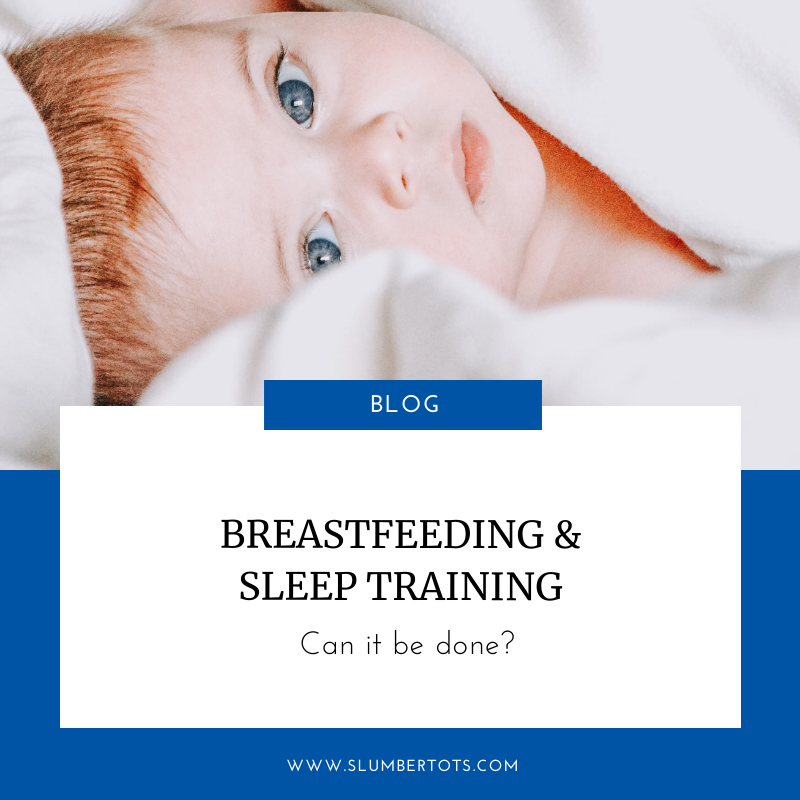
When I was expecting my first baby, I probably did more reading than I had ever done before. I was determined to know everything there was to know about having a baby, raising a child, and everything that had anything to do with parenting. Breastfeeding, nappies, toys, the list goes on!
But there is just so much information out there isn’t there?!
One thing I had no idea there was so much to know about, was sleep. Babies wake up in the night, they need feeding, right? But do they…or are we creating a feed to sleep association? And once you’re there, can you sleep train whilst breastfeeding?
You’ve probably read lots of opinions. Perhaps, that breast milk gets digested faster than formula, and therefore babies who are breastfed need to wake up several times a night in order to feed. Otherwise, they’ll feel hungry throughout the night and be unable to sleep.
Like most things in parenting, there’s not so much of a “right and wrong,” rather it’s “right for your child”. But there are a few facts that you should know if you’re breastfeeding and deciding whether or not to sleep train your child. After all, what’s the point of sleep training if your baby’s nutritional needs prevent them from sleeping through the night?
Nobody sleeps through the night!
Firstly, nobody sleep through the night! You might think you do, or that you did before you had kids, or that your partner does. But I assure you, you wake at least a few times during the night, every night, and you always have. To understand more about this, and sleep cycles, have a read of this blog post.
So when we talk about babies sleeping through the night, we’re really just saying that they’re able to get to sleep on their own. And this is because they have independent sleep skills.
So it doesn’t matter how your baby is fed, they’re going to wake up at night, several times, for the rest of their lives. Just like everyone else.
Breast milk digests faster than formula
As for the idea that breast milk digests faster than formula, that’s actually true. But not to the degree that a lot of people think. Newborns can go about 2 1/2 – 3 hours between feeds if they’re breastfeeding. If they’re on formula, that number is closer to 4 hours. So it’s not like formula is some kind of magical elixir that’s going to keep your little one full and satiated for 10-11 hours. Their stomachs are small and they’re going to digest liquid food quickly, no matter where it comes from.
What does that mean for parents of newborns in regards to their newborn babies sleeping 11 – 12 hours through the night? Well, simply put, forget it. I mean, it happens. Some babies are such sleep aficionados that they’ll go down for the night regardless of hunger. But they’re few and far between. Chances are, you’re going to have to get up once or twice a night to feed your little one until they’re about 6 months old.
Now, that doesn’t mean that you should put your baby’s sleep on a back burner until they’re 6 months. Quite the opposite, in fact. Teaching your baby to fall asleep independently is something you can’t start too early. (my newborn sleep kit will help with this!). I just want you to understand that if they’re under 6 months old, you might not get a full night’s sleep just yet. But it doesn’t hinge on whether they’re breastfed or formula fed. Both are going to have similar results when it comes to keeping baby feeling full.
After the six month mark, or thereabouts, your baby may be able to sleep through without a feed. This includes babies who are breastfed.
If my baby is 6 months old, are they still hungry at night?
If baby’s waking up five times a night for a feed, the principle of feeding on demand would require you to get up and feed baby five times a night, right?
Technically, yes. But if baby’s six months of age, gaining weight at a normal rate, and eating as many calories as they need during the day, they may not be waking in the night for food. The most common reason for waking past six months is because feeding is part of their strategy for falling asleep.
This is something else that we adults have in common with our babies. We all have strategies for getting to sleep. As grown ups, we establish our own little ritual for bedtime. We might get a glass of water, brush our teeth, get into a specific position, or read a book for a little while. In the end, it’s a strategy that helps to signal our brains and bodies that it’s time for sleep.
Baby sleep strategies are less sophisticated, but they still serve the same purpose. They help baby get into a familiar, comfortable place where their system recognises what it’s supposed to do, and they nod off.
So if feeding is part of that strategy, then it doesn’t matter to them if there’s actual food coming their way. It’s the sucking motion, the feel of mom next to them, the familiarity of the situation, that helps them to get to sleep. And they can become dependent on it.
How do I know if my baby is waking from hunger?
Obviously, every baby is different, and some may actually still be getting hungry enough during the night to need a feed. With that in mind, there are a few indicators that can help let you know if those nighttime wake ups are the result of hunger or a lack of independent sleep skills.
• Does baby only take a small amount when they feed in the night?
• Is baby falling asleep within five minutes of starting their feed?
• Will baby eventually go back to sleep if they don’t get fed?
• Do they only sleep for 45 minutes to an hour after a nighttime feed?
If you answered yes to most or all of those, then your little one probably falls into the “feeding as a sleep strategy” camp. And they could benefit significantly from learning a few sleep skills. It doesn’t mean that you can’t breast feed on demand. Just that you’ll have to reassess when baby needs a feed and when they’re looking for help getting to sleep.
So, to answer the question posed at the start of this post, are sleep training and breastfeeding mutually exclusive? The answer in my mind is no. Breastfeeding is an absolutely wonderful experience for both mother and baby, and I support it 100%. Having a baby who sleeps through the night is maybe not quite as magical, but it sure comes close. And there’s absolutely no reason why you can’t have both together.
If you would like my support in teaching your baby some independent sleep skills, click here to join my waitlist!
